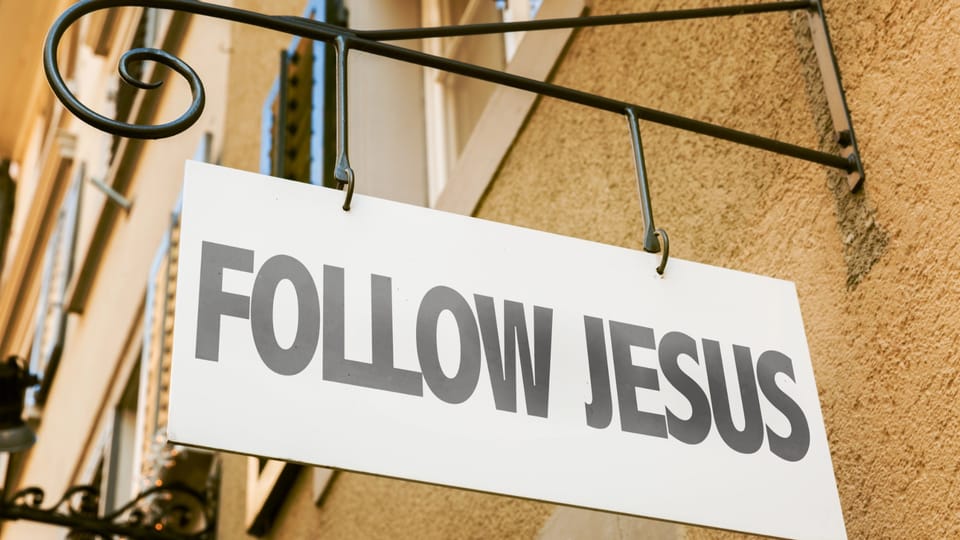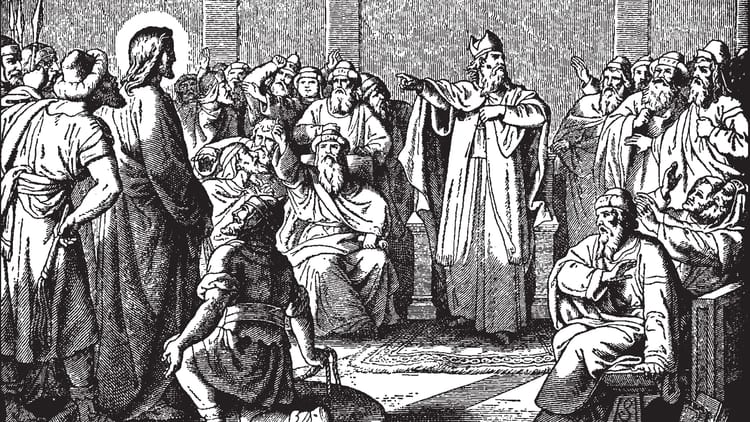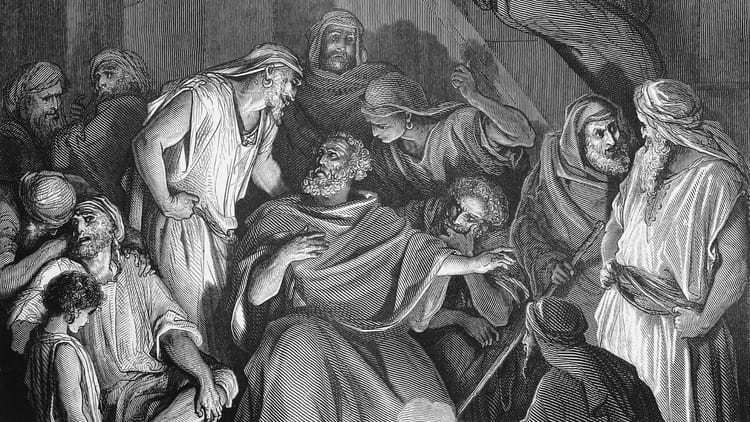The Price of the Cross (Mark 8:27-9:1)

A restaurant near our house advertised that for one night only all entrées at the restaurant would be free. That was far too good to pass up. So, on that night, we went to that restaurant, paid for parking, lined up for over an hour in a rain, and eventually got in. The entrée was free, so we thought we could live a little. We ordered all kinds of appetizers. We ate the free entrée, but then we splurged on desserts. We really had a good time.
Finally, the time came for the waiter to bring us the bill for the free meal. We were shocked! We paid for parking, waited in the rain for over an hour, and ended up spending as much as we would on a regular night out. Our free meal cost us far more than we bargained for.
A big spiritual danger is signing up for something we think is free but actually comes with a high cost. One of the greatest dangers we face is something I want to talk about this morning. It's that we don't understand, and that we aren't prepared to pay, the price of the cross.
John Piper says, "Living to magnify Christ is costly." Did you hear that? The only thing that I want to do today is to talk about the cost of following Jesus, because it is far more costly than we have bargained for. "Living to magnify Christ is costly."
Dietrich Bonhoeffer wrote:
Cheap grace is the deadly enemy of our Church… Cheap grace therefore amounts to a denial of the living Word of God, in fact, a denial of the Incarnation of the Word of God… Cheap grace has turned out to be utterly merciless to our Evangelical Church. This cheap grace has been no less disastrous to our own spiritual lives.
Let's put it this way. If we don't understand the price of the cross, the price that it costs us, then we don't understand the cross at all. If we understand everything about the gospel but don't understand the cost, we don't understand the gospel at all.
There's a flip side. Embracing the price of the cross changes everything.
So I want to do only two things today. The first is to ask what the price of the cross is. The second thing I want to do is to look at the payoff: what happens if we pay this price. What's the price of the cross? And what's the payoff when this price is paid? Let's look at these two things.
The Price of the Cross
The story we're going to look at today is the watershed event in the Gospel of Mark. The main question of the first part of the Gospel of Mark is this: Who is Jesus? Who is this man, this teacher, Jesus Christ? Finally, in the passage that was just read for us, the question is answered. Read verses 27 to 30 with me:
Jesus and his disciples went on to the villages around Caesarea Philippi. On the way he asked them, "Who do people say I am?"
They replied, "Some say John the Baptist; others say Elijah; and still others, one of the prophets."
"But what about you?" he asked. "Who do you say I am?"
Peter answered, "You are the Messiah."
Jesus warned them not to tell anyone about him.
So here we have it settled. Finally we have the identity of Jesus revealed. Peter is willing to commit and say, "I have listened to you talk, and I've seen what you've done, and I'm prepared to say that you are the Messiah." What does Messiah mean? Literally, it means anointed one, someone chosen by God and empowered by God to accomplished a specific task. Around the time of Jesus, the Messiah was understood to be a king who would deliver the nation of Israel, and restore David's kingdom to its former greatness. Peter identified Jesus as the one who would become king of Israel and to reign on the throne in Jerusalem. So this is the watershed moment of Mark. Jesus' identity has finally been revealed.
But here's the thing. The Messiah, the deliverer who would restore David's kingdom, is a victor. They had no category for a Messiah who suffered. There was nothing in their understanding of who the Messiah is from their understanding of the Hebrew Scriptures to indicate that the Messiah would suffer. Sure, there were Scriptures that talked about a mysterious suffering servant in Isaiah, but they didn't think of the Messiah when they read that. They had no category for a Messiah who suffered.
At this watershed moment, look at what happened in verses 31-32:
He then began to teach them that the Son of Man must suffer many things and be rejected by the elders, the chief priests and the teachers of the law, and that he must be killed and after three dayse rise again. He spoke plainly about this, and Peter took him aside and began to rebuke him.
Well, let's look at that. What does "Son of Man" mean? It's Jesus' favorite term for himself. We look at it and think, "Of course, everybody is a son or daughter of man." But that's not what Jesus meant when he used this term. He was using a term from the Hebrew Scriptures. The most revealing passage is from Daniel 7:13-14:
In my vision at night I looked, and there before me was one like a son of man, coming with the clouds of heaven. He approached the Ancient of Days and was led into his presence. He was given authority, glory and sovereign power; all nations and peoples of every language worshiped him. His dominion is an everlasting dominion that will not pass away, and his kingdom is one that will never be destroyed.
So here you have Jesus: Messiah, the king who would restore David's throne, who would appear in the glory of God and be worshiped by everyone in an indestructible kingdom. It's all good. The Messiah, they thought, was a glorious and powerful figure, not a suffering one.
But Jesus says that "the Son of Man must suffer many things and be rejected…and that he must be killed." You can see why Peter argued. It was a horrible instrument of execution in which you were stripped of all dignity and clothes and barbarically killed. The cross is the very opposite of the throne. But the Son of Man, Jesus says, must be killed.
Look what happens in verse 34: "Then he called the crowd to him along with his disciples and said: 'Whoever wants to be my disciple must deny themselves and take up their cross and follow me.'"
Here's what we need to know. Christianity is essentially about following the leader. No true follower refuses to go where the leader leads. And this is where the road to following Jesus leads: to the cross. The price of following Jesus is that we have to go where Jesus went, and where did Jesus go? To the cross. Dietrich Bonhoeffer says, "When Christ calls a man, he bids him come and die." Jesus doesn't call us to a pleasant afternoon walk. He doesn't ask for a few modest adjustments. He calls us to die. Jesus says, "Whoever wants to be my disciple must deny themselves and take up their cross and follow me."
Let's look at what this means for us today before we look at the payoff.
"Whoever wants to be my disciple must deny themselves…" We generally organize our life around – who? – ourselves. Let me tell you some of the things I like. I like getting things my own way. I love ease, comfort, and security. We generally like our lives to be as long and trouble-free as possible. Is this right? This is our natural inclination.
But Jesus says that following him means denying ourselves. This doesn't mean that we deny things to ourselves, like giving up ice cream or TV. It's much more radical than that. It's about renouncing myself as the dominant element in my life. It's turning away from the idolatry of self-centeredness and every attempt to orient one's life by the dictates of self-interest. It's a fundamental reorientation of the principle of life. God, not self, must be at the center of life.
It also means taking up the cross. What does that mean? People who carried a cross back in that day were on their way to be executed. Taking up our cross means following Jesus to suffering and death. John Piper says:
Daily Christian living is daily Christian dying. The dying I have in mind is the dying of comfort and security and reputation and health and family and friends and wealth and homeland. These may be taken away from us at any time in the path of Christ-exalting obedience. To die the way Paul did, and to take up our cross daily the way Jesus commanded, is to embrace this life of loss for Christ's sake and count it gain… Take up your cross and follow Jesus. On this road, and this road alone, life is Christ and death is gain. Life on every other road is wasted.
It also means following Jesus, no matter where that leads. It's about following him obediently no matter where he leads. We want to follow Jesus, but with conditions. We want to follow with terms that must be fulfilled. But discipleship can tolerate no conditions. We follow where Jesus chooses us to go, not the way we would choose for ourselves. Somebody has said, "Discipleship can tolerate no conditions."
What's the price of the cross? Everything. It only costs our lives. That's all. It involves a complete reorientation of our lives away from ourselves and around Christ, no matter what it costs. "Daily Christian living is daily Christian dying" (John Piper).
Let's stop here for a minute. This isn't optional for the advanced Christians. Jesus says, "Whoever wants to be my disciple must deny themselves and take up their cross and follow me." These aren't the advanced requirements; these are the minimum requirements.
And this is exactly where, perhaps, we're coming short. We face the temptation of:
…a more congenial, less rigorous variant of Christianity… We live in a consumeristic society, and many approach a religious life no differently than any other aspect of their life. They come to churches as consumers, wanting to know, "What am I going to get from this?" They want a full-service church with pleasing worship, a good youth program, excellent child care, nice facilities, pastoral care when they need it, and at last passable preaching. They want the best but are not always willing to pay for it. The prefer religion à la carte and opt for the salads and desserts, but not the main course with its hard demands of obedience. (Darrell Bock)
The very response we want to offer Jesus — half-hearted devotion without it costing too much — is the one response that isn't on the table. We can completely reject the demands of Jesus and hate him, or we can give up all of our lives in complete devotion. The only thing we can't do is to follow him a little. If we follow him, it costs us our lives.
The Payoff
So why would we ever do this? Why not hold on to our lives instead of losing them? You have a choice. You can hold on to your own life if you want – but the results are disastrous. You can hold on to your life, but in the process you'll be wasting it.
John Piper tells a story of a couple that he read in the Reader's Digest. They took early retirement from their jobs when he was 59, and she was 51. They moved to Punta Gorda, Florida, where they cruise on their 30-foot trawler, play softball, and collect shells. Piper says:
Tragically, this was the dream: Come to the end of your life – your one and only precious, God-given life – and let the last great work of your life, before you give an account to your Creator, be this: playing softball and collecting shells. Picture them before Christ at the great day of judgment: "Look, Lord. See my shells." That is a tragedy. And people today are spending billions of dollars to persuade you to embrace that tragic dream. Over against that, I put my protest: Don't buy it. Don't waste your life.
David Lodge wrote a novel called Therapy. The therapist of the main character asked him to list all the good things about his life in one column and all the bad things in another. Under the good column he wrote, "professionally successful, well off, good health, stable marriage, kids successfully launched in adult life, nice house, great car, as many holidays as I want." Under the bad column he wrote just one thing: "feel unhappy most of the time."
You can hold on to your own life, Jesus says. That's your choice. But if you hold on to your own life, Jesus says, you'll lose it. "For whoever wants to save their life will lose it" (Mark 8:35). You can hold on to your own life and preserve it, but in the end you'll end up empty-handed. Attempts to hold on to our lives are destined to fail. You can choose this option if you'd like. Jesus will not force you to follow him. But if you choose the path of preserving your own life, you'll lose not only your own life in the end – you'll lose everything. You can gain the whole world and, in the end, lose your own soul.
But there's an alternative. If we deny ourselves, take up our cross, and follow Jesus, there are three results:
A New Identity
Jesus says in verse 35, "whoever loses their life for me and for the gospel will save it." What Jesus is talking about here is our psyche, our identity, our sense of selfhood. What is Jesus saying here? He's telling us not to get our identity from the things of this world.
Tim Keller reminds us that every culture points to certain things and says, "If you gain those and acquire those, and achieve those, then you'll know you're somebody. Then you'll have a self." In our case, it largely has to do with career, possessions, and status. In other words, culture tells us that our identity is performance based. Jesus tells us that doesn't work. If we gain the whole world, he says, we still don't have an identity.
The reality is that no matter what we accomplish in our lives, it still doesn't give us an identity. And if those things are taken away – our career, a relationship – we fall apart if our self is based on it. Jesus says, don't get your identity from these things. Don't even switch to spiritual performance-based identity. Do something new. Lose your old identity and base your new identity on Jesus and the Gospel.
When we follow Christ, we aren't captive to what we've accomplished or who approves of us. We get our identity and strength not based on how we're doing. It comes from Christ. We die to the old ways of getting our identity. Nobody puts this better than C.S. Lewis in the last couple of pages of Mere Christianity:
The more we get what we now call "ourselves" out of the way and let Him take us over, the more truly ourselves we become. There is so much of Him that millions and millions of "little Christs," all different, will still be too few to express Him fully…It is no good trying to "be myself" without Him…It is when I turn to Christ, when I give myself up to His Personality, that I first begin to have a real personality of my own.
So Christ gives us a new agenda, not based on what we do or have but based on Him and his relationship with us, which can't be shaken. It's an identity that can't be taken away. Ironically, it's only as we stop trying to earn approval that we receive the love and approval we've always longed for, and that will never be taken away.
He also gives us:
A New Agenda
Peter was furious with Jesus because he had an agenda. Jesus had other ideas. When we come to Christ, we discover that we've given up our right to negotiate. You don't negotiate with a king. We go where he goes, even if it's to a cross. But because he went to the cross for us, we can trust him. "Lord, whatever you say, I will do. Whatever you send, I will accept. Because at the cross you said 'Not my will but thine be done' for me, now I say 'Not my will but thine be done' for you."
When we come to the cross, we die to ourselves, to our self-determination and our own agendas.
A New Destiny
The last couple of verses project what happens as we take this course. Those who refuse this path end up living out the consequences of not following Christ. But those who choose this path see something else. Mark 9:1 says, "Truly I tell you, some who are standing here will not taste death before they see that the kingdom of God has come with power." Jesus isn't referring here to his return to earth. He's saying that he started in weakness, but that it ends with a new heaven and earth. But it won't always be a kingdom of weakness. One day, love will totally triumph. Even now in this generation, you'll start to see it happen. Whatever it costs you now, it will be more than made up for later.
Lewis says:
Give up your self, and you will find your real self. Lose your life and you will save it. Submit to death, death of your ambitions and favorite wishes every day and death of your body in the end: submit with every fiber of your being, and you will find eternal life. Keep back nothing. Nothing that you have not given away will ever really be yours. Nothing in you that has not died will ever be raised from the dead. Look for yourself, and you will find in the long run only hatred, loneliness, despair, rage, ruin, and decay. But look for Christ and you will find Him, and with Him everything thrown in.
Living for Christ is costly. It will cost you everything. But it's not nearly as costly as living for ourselves. "Take up your cross and follow Jesus. On this road, and this road alone, life is Christ and death is gain. Life on every other road is wasted." (Piper)





